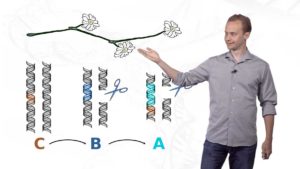Kevin Esvelt received his B.S. in Chemistry and Biology from Harvey Mudd College and his Ph.D. from Harvard University. As a Technology Development Fellow of the Wyss Institute, he worked with Dr. George Church at Harvard Medical School. He helped to develop CRISPR as a genome editing tool and was the first to identify the potential of CRISPR-based gene drive to alter populations of wild organisms. Esvelt recognized that this technology could allow scientists to influence the evolution of entire ecosystems to prevent disease or benefit the natural world. He has been a strong advocate for public input and open discussion of any project that may utilize gene drive.
As of 2016, Esvelt is an Assistant Professor at the MIT Media Lab and Leader of the Sculpting Evolution Group. His lab is working to develop technologies that allow for the local alteration of organisms. They also are developing systems that would allow genetic changes in the wild to be overwritten or reversed. One of the many projects pursued by the Sculpting Evolution Group is the “Mice Against Ticks” project on Nantucket and Martha’s Vineyard islands. The effort, led by Esvelt, strives to prevent tick borne disease by permanently immunizing mice.







